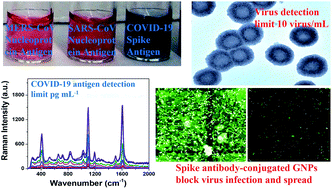Severe acute respiratory syndrome coronavirus 2 (SARS-CoV-2), the cause of the coronavirus disease that began in 2019 (COVID-19), has been responsible for 1.4 million deaths worldwide as of December 13. November 2020. Because a vaccine is not yet available at the time of writing, a rapid diagnostic test is urgently needed. In this paper, we present the development of gold nanoparticles bound to anti-spike antibodies for the rapid diagnosis of specific COVID-19 viral antigen or virus through a simple observation of colorimetric change within a time period of 5 minutes.

For rapid and highly sensitive identification, surface enhanced Raman spectroscopy (SERS) was employed using 4-aminothiophenol as a reporter molecule, which binds to the gold nanoparticle through an Au-S bond. In the presence of COVID-19 antigen or virus particles, due to the antigen-antibody interaction, the gold nanoparticles undergo aggregation, changing color from pink to blue, allowing the determination of the presence of antigen or virus very quickly by the nude. eye, even at concentrations of 1 nanogram (ng) per ml for the COVID-19 antigen and 1000 virus particles per ml for the SARS-CoV-2 spike protein pseudotyped baculovirus.
Importantly, the aggregated gold nanoparticles form "hot spots" to provide a very strong enhancement of the SERS signal from anti-pico antibodies and gold nanoparticles bound to 4-aminothiophenol through light-matter interactions. Finite difference time domain (FDTD) simulation data indicate a Raman enhancement of 4 orders of magnitude at "hot spot" positions when gold nanoparticles form aggregates. Using a portable Raman analyzer, our reported data demonstrates that our antibody and 4-aminothiophenol-bound gold nanoparticle-based SERS probe have the ability to detect COVID-19 antigen even at a concentration of 4 picograms (pg) per ml and virus at a concentration of 18 virus particles per ml in a time period of 5 minutes. Using HEK293T cells,
which express the angiotensin converting enzyme 2 (ACE2), by which SARS-CoV-2 enters human cells, we show that gold nanoparticles bound to anti-spike antibodies have the ability to inhibit infection. by the virus. Our reported data shows that antibody-bound gold nanoparticles bind to the SARS-CoV-2 spike protein, thereby inhibiting the virus from binding to cell receptors, stopping infection and the spread of the virus. It also has the ability to destroy the lipid membrane of the virus.